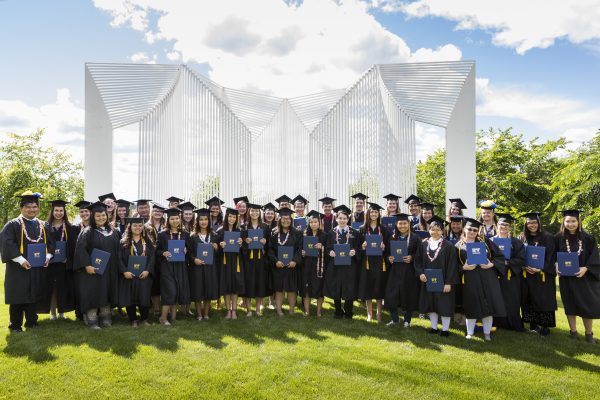Rural Alaska Honors Institute celebrates 36th graduation
July 12, 2018
Leona Long
907-474-5086

Forty Alaska Native and rural high school students from 29 rural communities have graduated from the 2018 Rural Alaska Honors Institute. A cap-and-gown ceremony to recognize the graduates will be held at 1 p.m. Thursday, July 12, at the University of Alaska Fairbanks’ Schaible Auditorium.
“The Rural Alaska Honors Institute is a college bridge program that squeezes a semester’s worth of rigorous academics, community service projects and university life into six weeks,” said Denise Wartes, RAHI program manager. “Their RAHI experience teaches them to thrive academically and adjust from living in a village to living on a college campus or in an urban community. It's life-changing and sets students on the path for future success.”
The 2018 graduation ceremony will feature speeches by RAHI’s top students. The RAHI valedictorian is Kastyn Lie from Nome. The salutatorian is Lisa Tran from Unalaska. The valedictorian for RAHI's research program is Leanida Polushkin from Voznesenka.
RAHI has become become a family tradition in rural Alaska. Three of the 2018 students have parents who attended RAHI, and seven students have a sibling who attended.
For keynote speaker Debbie Mekiana, the ceremony will be especially meaningful because her son graduated. Originally from Anaktuvuk Pass, the two-time RAHI alumna earned bachelor’s and master’s degrees from UAF. Her experience as a peer adviser inspired Mekiana to serve UAF students, first as an adviser and director at Rural Student Services and now as the student success coordinator for the Department of Alaska Native Studies and Rural Development.
“The Rural Alaska Honors Institute prepared me for college,” said Mekiana. “When I came to UAF, RAHI introduced me to Rural Student Services. UAF gave me the opportunity to achieve my own dream of helping students like myself earn degrees and reach our educational goals. I am thrilled my son had to the opportunity to be part of RAHI this year.”
Every year, some of the top students are given scholarships from UAF and RAHI alum Kyan Olanna and her husband, John Kakaruk. Kastyn Lie, Lisa Tran and Logan Ito received $1500 scholarships from UAF. Starting in 2009, monies were distributed to the top students in the Students’ Choice Award for Most Outstanding Student. Students who receive the Kyan Olanna and John Kakaruk Scholarship must attend the University of Alaska. Claire Mueller received a $2000 and Olivia Juhl, Edith Spear and Robbie Strunk each received a $1000 Kyan Olanna and John Kakaruk Scholarship.
In the early 1980s, Alaska Native and university leaders were perplexed about the high dropout rate and the low number of rural and Alaska Native students who were completing college degrees. That’s one reason UAF established RAHI in 1983.
Alumni not only go on to college — they achieve academic excellence. About two dozen alumni have graduated with degrees from Ivy League and elite universities, and hundreds more have degrees from the University of Alaska. This past academic year alone, 46 former RAHI students earned bachelor’s degrees, eight earned master’s degrees, one graduated from law school, and another earned a Ph.D. Three alumni earned graduate certificates in teaching and another three earned their teaching certificates.
“RAHI’s success is measured in degrees,” said Gregory Owens, academic coordinator for RAHI. “Since its inception 36 years ago, RAHI has created a culture of learning that can be felt throughout Alaska. We provide a rigorous academic curriculum that helps students stand out, whether it’s at the University of Alaska, an elite university or prestigious law school.”
In partnership with UAF’s Biomedical Learning and Student Training program, six students participated in RAHI research. Groups of two students were each paired with a research mentor. The students studied protein plasma levels in Steller sea lions, assessed available resources for postpartum depression and examined swimmer's itch at Fairbanks beaches. The students presented their research in a report and displayed their findings in posters.
Since its inception in 1983 at the request of the Alaska Federation of Natives, RAHI has prepared almost 1,900 rural and Alaska Native high school students to adjust academically and socially to college life. While at RAHI, students earn up to 11 college credits. In addition to required courses in English, library science and study skills/transition to college, traditional RAHI students choose from electives in process technology, business, chemistry and math. Three times a week, students participate in karate, yoga or Alaska Native dance classes.
RAHI is made possible by financial support from the UAF College of Rural and Community Development and sponsors, including Wells Fargo, Alyeska Pipeline Service Co., Arctic Slope Community Foundation, First National Bank of Alaska, Sitnasuak Native Corp., ConocoPhillips, Educators Rising, Donlin Gold, Ravn Alaska, Boeing and Crowley. Students attend at no cost and have their travel expenses paid. For more information, visit www.uaf.edu/rahi.


